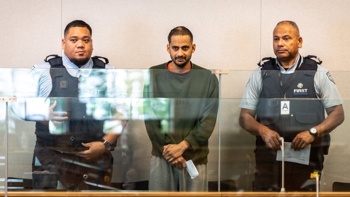Officials are scrambling to identify the source of infection for a man who tested positive days after completing managed isolation, as the Government prepares to announce whether the country can drop to alert level 1.
The mystery case recorded two negative results while quarantined in Christchurch but has now passed the virus on to two people in his household, including a student at a Mt Roskill school.
The four new cases confirmed yesterday - two in the community - come as Prime Minister Jacinda Ardern is due to announce changes to the country's alert levels after Cabinet meets today.
The latest community cases are unrelated to the Auckland cluster and stem from a man who arrived in New Zealand from India and tested negative while in isolation - sparking calls from one of the country's top epidemiologists for the Government to consider reviewing our two-week quarantine period.
The man was allowed to fly home to Auckland from a managed isolation facility in Christchurch on September 11 after leaving quarantine, but tested positive five days later.
One of the people he infected is a child at Three Kings School in Mt Roskill, which the public health service says remains safe for children to attend as the student did not attend while infectious.
The student and two other close contacts are now in a managed quarantine facility.
Three Kings School principal Moira Blair said the school underwent a "deep clean" yesterday as a precaution to reassure parents.
It is unknown how the man was infected and the Ministry of Health is now investigating whether it was during his flight from India. The genome sequencing is consistent with two confirmed cases from the same flight, which landed on August 27.
"It is possible that this case was infected during that flight and has had an extremely long incubation period – there is evidence that in rare instances the incubation period can be up to 24 days," the ministry said.
But the man could have also been infected during a Government-chartered flight with other returnees in managed isolation facilities from Christchurch to Auckland after leaving the facility nine days ago. People on this flight were being contacted and assessed.
The ministry said most people who are infected with Covid-19 will become unwell within 14 days.
"Having returnees stay in managed isolation for 14 days remains the gold standard, and this is also the approach adopted by other countries."
"It's a curious case," Otago University infectious diseases expert David Murdoch told Newstalk ZB's Mike Hosking today. "One theory is that it's a long incubation period. In very rare instances you do get prolonged incubation periods with this infection, but it would certainly be unusual."
He could not speculate on whether Auckland would move down from level 2.5 this week but believed the chances of New Zealand moving to level 1 were "pretty high".
The two imported cases confirmed yesterday were a man in his 30s who arrived from London via Dubai on September 16 and a man in his 20s who arrived from India via Singapore on September 12.
There are 71 active cases - 36 are imported cases in MIQ facilities and 35 are community cases.
Three people are in hospital with Covid – one each at Auckland City, Middlemore and North Shore hospitals. All three patients are in isolation on a general ward.
Epidemiologist Professor Michael Baker said cases such as the man testing positive after completing two weeks in isolation were "very unusual".
However it was documented that some people had unusually long incubation periods, and he believed it was worth reviewing whether New Zealand should lengthen the isolation period.
"Basically 14 days has always been a practical maximum, but we've always known there was potential for the maximum to be longer than 14 days in very rare cases," he said.
The person could also have been infected within the managed isolation facility, in which case the genome sequencing could connect him with another case from the facility.
Baker said each option - including the man being infected on the Christchurch flight - was concerning for different reasons, and he questioned whether further rules were needed for people leaving managed isolation.
He was unsure what advice people received upon leaving, but said they could be advised to avoid mingling with anyone other than those in their family group for a week, and to wear masks.
"Our procedures are going to be right in almost all situations. Now and then we will be tested by events that are right at the limits of what is normal."
Take your Radio, Podcasts and Music with you










